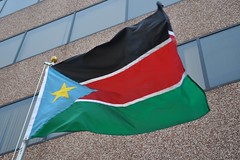 Image by martha_jean via Flickr
Image by martha_jean via FlickrSouth Sudan, the world's newest country, was proclaimed 11 July and its President, Salva Kiir Mayardit has declared that his promise of equality would not be extended to lesbians and gays.
South Sudan was formerly subject to the Sudanese interpretation of Sharia law, under which homosexual activity was illegal, with punishments ranging from lashes to the death penalty. In 2003 the government of what was then called "New Sudan" adopted its own penal code, and in 2008 the autonomous Government of Southern Sudan adopted a replacement penal code. Both codes prohibited sodomy.
In May 2010 Mayardit spoke of a New Sudan where "all citizens" enjoy "equal rights" in a country based on "democracy, equality and justice". But Mayardit said that LGBT recognition was "not in our character."
"It is not even something that anybody can talk about here in southern Sudan in particular. It is not there and if anybody wants to import or to export it to Sudan, I will not get the support and it will always be condemned by everybody."Mayardit is wrong that "it" is not "there". In an article for the expat Bor Globe Network last October, Majur Deng Nhial wrote:
"There are people out there who congenitally conceal their true sexes for fear of being considered abnormal and not to be regard with extreme hatred and hostility. They also remain impassive not to distort families’ histories that can bring inerasable shame to the kinships. Another reason is that, there are no potential mates interesting in anal intercourse. Presumably, the mentioned suggestions could be why there was silence in their sexual behavior in the Sudan."Two ancient cultures present in South Sudan, Nubian and Cushite, have had homosexuality as "an intricate part of the society."
Nhial relates the story of a South Sudanese gay man living in Kakuma Refugee Camp, Kenya:
"Kuma (not a real name) was a fashionable gentleman who loved to hangout with girls quite often. His voice box and walking style was of a female, but everybody else was sucking a thumb saying “Oh! he got all of them, all the girls” because he had a physical grace and beauty that attracted girls; that was a moment he wrestled with his true gender identity, but nobody paid attention until his arrival to the United State where he found liberty."John Mathenge of HOYMAS, a Kenyan support group for MSM and gay men living with HIV, told the Kenyan website Freedom in Speech last month:
"We have cases of Somalis and Sudanese who are MSM or gay in our records. Many flee their countries because of political instability but when you get to learn their story you realize they ran away for a completely different reason. The ones I have met are gay or MSM and many end up engaging in sex work here in Nairobi to earn a living."Activities addressing HIV/Aids in South Sudan do not include the needs of LGBT or men-who-have-sex-with-men (MSM), and a need for research has been identified. A World Bank report from April said:
"Hardly anything is known about two important high-risk populations that probably exist in Southern Sudan – men who have sex with men (MSM) and injection drug users (IDU) – both of these populations (including male sex workers) have been identified in neighbouring countries, and there is no reason to assume that they do not also exist in Southern Sudan. Even if their numbers are small, their behaviours mean that their HIV incidence rates can be very high."Despite western media reports that the country is mainly Christian, most South Sudanese maintain traditional indigenous (sometimes referred to as Animist) beliefs and the government has supported freedom of religion. But the Christian church is very influential and in 2006 the Archbishop of the Anglican Church of South Sudan, Rt. Rev most Archbishop Abraham Mayom Athiaan told the Sudan Tribune:
"We, the bishops together with our congregation of the Anglican church of the Sudan (ACS) strongly condemn the practice of homosexuality, abortion which is being practiced in Episcopal Church of Sudan (ECS) leaderships."








 Join our page
Join our page


We the LGBTI people do exist in South Sudan!Its appalling that our own government should deny our existence!
ReplyDeleteGrowing up in South Sudan I new I was a lesbian but did not understand it and remained closeted most of my adult life out of fear. Don't I have the right to be who I am.The Obama administration should cut aid to Countries like South Sudan to avoid another genocide.
LOOK AT ME MY WEBSİTE TURKEY
ReplyDeletetravesti
travestitravesti
travesti
izmir travestileri
istanbul travestileri
ankara travestileri
mersin travestileri
istanbul travestileri
bursa travestileri
izmir travestileri
konya travestileri
diyarbakır travestileri
mersin travestileri
sakarya travestileri
sakarya travestileri
istanbul travestileri
adana travestileri
antalya travestileri
eskisehir travestileri
samsun travestileri
kocaeli travestileri
izmir travestileri
eskisehir travestileri
kayseri travestileri
eskisehir travestileri